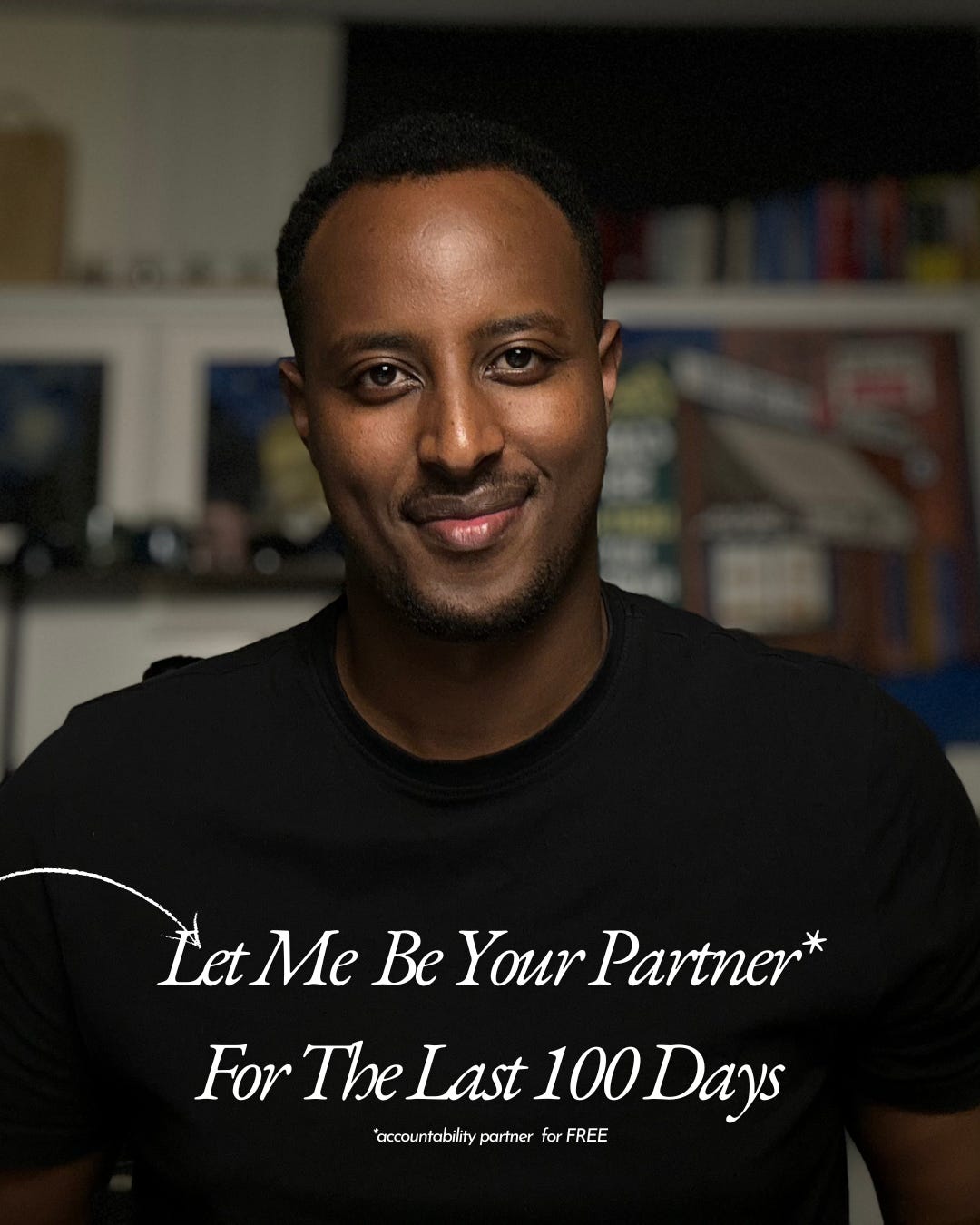Let Me Your Partner For The Last 100 Days
A Public Experiment in Finishing the Year Strong
Every year, something amazing happens around late September. We cross an invisible threshold, the final 100 days of the year. Most people don't notice it.
Some treat it as just another Monday. Others start saying, "I'll get back on track in January." I don't want us to do the same. That's why I'm launching The Last 100 Days Project, and I invite you to join me.
There's something uniquely compelling about the final quarter of the year. While others are winding down, settling into holiday routines, and mentally preparing for next year's resolutions, you have an opportunity to zig when everyone else zags.
It's about recognising that transformations happen when we are willing to act, while others are merely planning.
The psychology of endings is well-documented.
Dan Pink, in his book "When," describes the "fresh start effect", our tendency to tackle goals at temporal landmarks. What if we could harness that same motivational surge without waiting for January 1?
What if we could use the approaching year-end as fuel rather than an excuse to procrastinate?
The Last 100 Days Project is a simple social experiment:
From September 23 to December 31, you commit to taking one clear action every day. Something small enough to do, but meaningful to compound over time.
This is about the radical power of small, consistent actions. Your daily practice could involve writing a single paragraph of reflection, recording a 60-second video to share an insight, sketching for 15 minutes, or having one meaningful conversation.
The key is choosing something that aligns with who you want to become, not just what you want to accomplish.
The beauty lies in the constraint. One hundred days is long enough to push through the inevitable resistance, boredom, and low-energy periods that derail most attempts at change.
It's short enough to feel achievable and long enough to create lasting transformation. Most importantly, it's public, turning your personal commitment into a social contract that amplifies your accountability.
Habit formation research reveals why this approach works so effectively. Dr. Phillippa Lally's groundbreaking study at University College London found that it takes an average of 66 days for a new behaviour to become automatic.
The Last 100 Days Project gives you 34 additional days beyond that threshold, time not just to form the habit, but to solidify it, refine it, and make it genuinely yours.
The daily frequency is crucial. When we commit to something daily rather than weekly or sporadically, we eliminate decision fatigue. There's no negotiating with yourself about whether today is the day.
This creates what behavioural scientists call a "cue-routine-reward" loop in the brain, gradually shifting the behaviour from conscious effort to unconscious competence.
Public accountability adds another layer of psychological leverage. We are social creatures, wired to avoid disappointing others even when we're comfortable disappointing ourselves. So, by sharing your journey openly, you tap into our fundamental need for social approval and consistency, making it exponentially harder to quit when motivation wanes.
Why Public Matters More Than Perfect
Anyone can start a habit in private. The fundamental transformation happens when you're willing to be vulnerable about your process.
Doing The Last 100 Days Project publicly means accepting that some days will be messy, uninspired, or frankly disappointing. It means showing up even when your contribution feels inadequate or your energy is low.
This public vulnerability creates something beautiful: permission for others to be imperfect too. When you share your Day 73 struggle or your Day 89 breakthrough, you're not just documenting your own journey; you're creating a roadmap for someone else who might be wrestling with similar challenges.
The project becomes bigger than any individual participant can handle. It becomes proof that consistency beats motivation, that small actions compound into significant results, and that ordinary people can achieve extraordinary outcomes simply by refusing to quit.
Consider where you could be by December 31 if you start now.
One hundred pieces of content could become a comprehensive portfolio. One hundred days of movement could transform your health. One hundred meaningful conversations could expand your network exponentially.
One hundred moments of creative expression could unlock talents you didn't know you possessed.
My focus is on what happens beyond the immediate results. When you finish strong, you change your relationship with yourself.
You become someone who follows through, someone who can be trusted with bigger challenges, someone who understands that transformation happens not in dramatic moments but in quiet, daily decisions to show up.
This shift in identity ripples into every area of your life. You approach new challenges with confidence earned through consistent action. You stop looking for perfect conditions and start creating them through discipline.
You realise that the person you want to become isn't created through New Year's resolutions, they're forged through the accumulated weight of daily choices.
January 1 will arrive whether you join this experiment or not. The question is: will you arrive already in motion, or will you be starting from scratch? Will you enter the new year with momentum earned through 100 days of consistent action, or will you carry the familiar weight of another year of good intentions unfulfilled?
The Last 100 Days Project is about progression.
It's about starting with good enough and improving along the way.
Most importantly, it's not about doing it alone. I will be your partner, and you will be joining a community of people who believe that how you end the year sets the tone for everything that follows.
The choice is yours. The time is now.
The last 100 days of the year are waiting.


